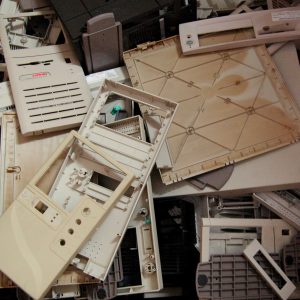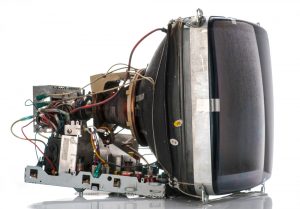E-scrap company FCM will be recycling plastics from scrap electronics at a site in Cornwall, Ontario.

E-Scrap News magazine is the premier trade journal for electronics recycling and refurbishment experts. It offers updates on the latest equipment and technology, details trends in electronics recycling legislation, highlights the work of innovative processors, and covers all the other critical industry news.
Sign up for our free weekly e-newsletters to receive the latest news directly.
E-scrap company FCM will be recycling plastics from scrap electronics at a site in Cornwall, Ontario.
The American Chemistry Council (ACC) has formed a group to promote plastics-to-oil technology, which a number of firms have been exploring to monetize material, including e-plastics, that would otherwise be sent to landfills.
 A study out of Europe highlights the environmental virtues of recycling plastics found in electronics, appliances and toys.
A study out of Europe highlights the environmental virtues of recycling plastics found in electronics, appliances and toys.
E-Scrap News readers had OEMs, exports and CRT glass in mind as we recap our most-read stories of the month.

Converge currently has 23 employees. Photo credit: Rafael Reveles.
Global e-scrap firm Sims Recycling Solutions has launched a subsidiary that aims to optimize processing plants, including those run by Sims competitors.
A-1 Freeman Records Management/Paper Pig Shredding of Wichita Falls, Texas; Alliance Document Shredding of Sulphur Springs, Texas; American Document Securities of Carrollton, Ga.; A Shred 2 Pieces of Irving, Texas; Citishred of St. Louis; Columbus Secure Document Solutions of Salt Lake City; Corporate Records Management of Dallas; On-Site Shredding of Stamford, Conn.; Security Shredding Mobile Document Destruction of Lufkin, Texas; Shred Boss of Roswell, N.M.; Shred Defense of Richmond, Calif.; Shredding Solutions of Lincoln, Neb.; Shred Doc Destr dba Balcones Shred of Dallas; Shred Monster of Columbus, Neb.; Shred-X Document Destruction of Blacktown, New South Wales, Australia; Shred-X Document Destruction of Laverton North, Victoria, Australia; Sustainable Services of Texarkana, Texas; Wasteco – Dixie Recycling Centre of Mississauga, Ontario, Canada; and Western Records Destruction of Boise, Idaho have either achieved or renewed their NAID certifications for physical destruction of hard drives.
ERI of Sumner, Wash. has achieved NAID certifications for hard drive sanitization as well as physical destruction of hard drives.
Confidential Materials Destruction Service of New Territories, Hong Kong and Congruity of Pembroke, Mass. have renewed their NAID certifications for hard drive sanitization as well as physical destruction of hard drives.
Sims Recycling Solutions announced that it has achieved NAID AAA certification for all of its U.S. onsite data destruction services.
Visit our archive to view previous editions of the scorecard.
 Recently, I had to go to Ikea to get some office gear. And I’m always struck by the same thing when I wend my way through the labyrinth that is that retail establishment, the just-so nature of all of their pre-fab rooms. It’s tantalizing, everything in its right place with its right purpose – a suggestion that even I can learn to live an uncluttered life.
Recently, I had to go to Ikea to get some office gear. And I’m always struck by the same thing when I wend my way through the labyrinth that is that retail establishment, the just-so nature of all of their pre-fab rooms. It’s tantalizing, everything in its right place with its right purpose – a suggestion that even I can learn to live an uncluttered life.
Ontario’s Environment Minister Jim Bradley last week introduced a new Waste Reduction Act and Strategy, which would make numerous changes to the province’s solid waste and recycling management, including doing away with controversial eco fees on electronics purchases.
 Investigations into CRT stockpiles and the filing of criminal charges over leaded glass disposal drew our readers’ attention last month.
Investigations into CRT stockpiles and the filing of criminal charges over leaded glass disposal drew our readers’ attention last month.
Abrams Mobile Doc. Dest. Svc. of Thomasville, Ga.; Avritek of San Diego; Beckley’s of Rochester, Minn.; Dakota Data Shred of Sioux Falls, S.D.; LeMay Mobile Shredding of Lacey, Wash.; Royal Document Destruction of Gahanna, Ohio; Secure Destruction Service of Birmingham, Ala. and Stevens & Stevens BRM of Greenville, S.C. have either achieved or renewed their NAID certifications for physical destruction of hard drives.
Visit our archive to view previous editions of the scorecard.
